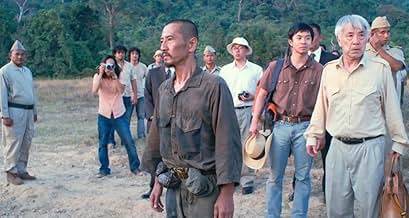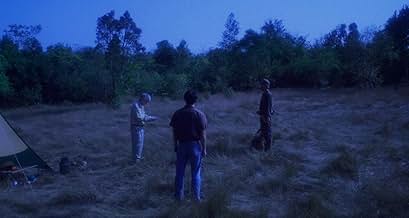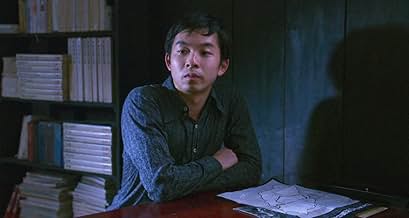AVALIAÇÃO DA IMDb
7,2/10
3,3 mil
SUA AVALIAÇÃO
Quando o Japão se rende no final da Segunda Guerra Mundial, o soldado Hiroo Onoda se retira para as selvas das Filipinas para continuar a guerra ele mesmo por outros dez mil dias.Quando o Japão se rende no final da Segunda Guerra Mundial, o soldado Hiroo Onoda se retira para as selvas das Filipinas para continuar a guerra ele mesmo por outros dez mil dias.Quando o Japão se rende no final da Segunda Guerra Mundial, o soldado Hiroo Onoda se retira para as selvas das Filipinas para continuar a guerra ele mesmo por outros dez mil dias.
- Direção
- Roteiristas
- Artistas
- Prêmios
- 5 vitórias e 20 indicações no total
Yûya Endô
- Hiroo Onoda - Young
- (as Endô Yûya)
Kanji Tsuda
- Hiroo Onoda - Old
- (as Tsuda Kanji)
Yûya Matsuura
- Kinshichi Kozuka - Young
- (as Matsuura Yûya)
Tetsuya Chiba
- Kinshichi Kozuka - Old
- (as Chiba Tetsuya)
Shinsuke Kato
- Shôichi Shimada
- (as Katô Shinsuke)
Kai Inowaki
- Yûichi Akatsu
- (as Inowaki Kai)
Issei Ogata
- Major Yoshimi Taniguchi
- (as Issey Ogata)
Taiga Nakano
- Norio Suzuki - The Tourist
- (as Nakano Taïga)
Nobuhiro Suwa
- Tanejirô Onoda - Onoda's Father
- (as Suwa Nobuhiro)
Mutsuo Yoshioka
- Captain Hayakawa
- (as Yoshioka Mutsuo)
Tomomitsu Adachi
- Governor-General Shigenori Kuroda
- (as Adachi Tomomitsu)
Kyûsaku Shimada
- Lieutenant Suehiro
- (as Shimada Kyûsaku)
Jemuel Satumba
- Filipino Prisoner
- (as Jemuel Cedrick Satumba)
Ryû Morioka
- Student
- (as Ryu Morioka)
Akira Morita
- Extra
- (as Morita Akira)
- Direção
- Roteiristas
- Elenco e equipe completos
- Produção, bilheteria e muito mais no IMDbPro
Avaliações em destaque
Greetings again from the darkness. There has been no shortage of conspiracy theories, either recently or historically, that have left non-believers bewildered at how 'the other side' held firm. Writer-director Arthur Harari and his co-writers Bernard Cendron and Vincent Poymiro bring the remarkable struggle of Hiroo Onoda to the screen. Onoda was a Japanese soldier who refused to believe WWII ended, and instead, continued his mission of resistance by spending thirty years in a Filipino jungle.
Onoda was only 22 when he entered the war in 1944. He is played as a young man by Yuya Endo, and in later years by Kanji Tsuda. The film goes mostly in chronological order, with only occasional flashbacks to Onoda's "special training" by Taniguchi (Issey Ogata), his trainer and trainer. The passing of years is noted on screen, and we watch as Onoda's squadron shrinks in size, holding at four for quite a while, before shifting to two, and finally only he remains. During the special training, Taniguchi declares, "You don't have the right to die", instilling a firm commitment to the cause in Onoda.
Also seared into Onoda's brain is the proclamation of, "We'll come back for you. No matter how long it takes, we'll come back for you." Still, it's fascinating to see his determination to keep fighting, despite so many signs that the war was over. He viewed magazine articles and radio broadcasts as tricks to draw him away from his mission ... going so far to decipher a coded message that was anything but that.
The young man who finally succeeds in lulling Onoda out of the jungle has his own mission - actually three of them: finding a panda, locating Onoda (by this time a legend), and tracking down a Yeti. It's a bittersweet moment for the long-dedicated soldier, and he went on to live many more years as a home country icon - considered a nationalist man of honor by some, a murdering fool by others. The film, and Onoda's saga, makes us question the point of war when it's impossible to tell if the war is over or ongoing. Harari's film is almost three hours, which is entirely too long ... but significantly shorter than the time Onoda spent in the jungle.
Releasing in theaters on October 14, 2022.
Onoda was only 22 when he entered the war in 1944. He is played as a young man by Yuya Endo, and in later years by Kanji Tsuda. The film goes mostly in chronological order, with only occasional flashbacks to Onoda's "special training" by Taniguchi (Issey Ogata), his trainer and trainer. The passing of years is noted on screen, and we watch as Onoda's squadron shrinks in size, holding at four for quite a while, before shifting to two, and finally only he remains. During the special training, Taniguchi declares, "You don't have the right to die", instilling a firm commitment to the cause in Onoda.
Also seared into Onoda's brain is the proclamation of, "We'll come back for you. No matter how long it takes, we'll come back for you." Still, it's fascinating to see his determination to keep fighting, despite so many signs that the war was over. He viewed magazine articles and radio broadcasts as tricks to draw him away from his mission ... going so far to decipher a coded message that was anything but that.
The young man who finally succeeds in lulling Onoda out of the jungle has his own mission - actually three of them: finding a panda, locating Onoda (by this time a legend), and tracking down a Yeti. It's a bittersweet moment for the long-dedicated soldier, and he went on to live many more years as a home country icon - considered a nationalist man of honor by some, a murdering fool by others. The film, and Onoda's saga, makes us question the point of war when it's impossible to tell if the war is over or ongoing. Harari's film is almost three hours, which is entirely too long ... but significantly shorter than the time Onoda spent in the jungle.
Releasing in theaters on October 14, 2022.
This is really an outstanding movie which is not a "war movie" but rather a complex psychological one of what drive us as a person to take a stand when confronted to situations we could not have ever imagined. Of course education, training, the society, family history, the culture of the country in which you were born, all of this will play a major role with regard to the choice(s) that we will take in life. However, as per prior personal experiences and call it maybe "the genetics" these choices will be different for people even having the same cultural background. The life story of lieutenant Onoda is maybe what you could call an "extreme" one which, besides cultural background, was certainly facilitated by his "physical adaptation" allowing him to endure the certain hardships and harrowing experiences he encountered during his many years of isolation.
Onoda is a long movie but its length was necessary not to develop the psychological development of the main character but rather to allow the viewer to "feel" what it must have meant in terms of hardship, endurance and faith the choices that Lieutenant Onoda took to honor his pledge of obedience regardless the validity of the cause he chose to defend.
The fact the movie Onoda was released in full pandemic, of the relatively unknown nature of the real history of lieutenant Onoda and that the film must only be shown in the Japanese language (with subtitles) as an indispensable component of the story will certainly limit its diffusion in theaters. Still this will not hamper the fact that this is cinema of the highest caliber and that Arthur Harari, its French director succeeded in making an admirable movie not to be missed!
Onoda is a long movie but its length was necessary not to develop the psychological development of the main character but rather to allow the viewer to "feel" what it must have meant in terms of hardship, endurance and faith the choices that Lieutenant Onoda took to honor his pledge of obedience regardless the validity of the cause he chose to defend.
The fact the movie Onoda was released in full pandemic, of the relatively unknown nature of the real history of lieutenant Onoda and that the film must only be shown in the Japanese language (with subtitles) as an indispensable component of the story will certainly limit its diffusion in theaters. Still this will not hamper the fact that this is cinema of the highest caliber and that Arthur Harari, its French director succeeded in making an admirable movie not to be missed!
In the closing phase of the Second World War, Imperial Japan inserts numerous specially trained soldiers throughout the Pacific islands whose secret mission is to survive at all costs and wage an unending campaign of guerrilla warfare. This film depicts the three-decade campaign of postwar "resistance" waged on Lubang Island, Philippines by Hiroo Onoda, the very last of the infamous Japanese "holdouts" who refused to accept the war had ended, against all reason and repeated attempts to make contact.
As a film, it's great - it's dramatic and engaging, with great writing, direction, and acting. But the deeper social reality is quite disturbing. Onoda and others like him are revered by many in Japan as exemplars of grit, determination, and steadfast dedication to duty, rather than as exemplars of the kind of rigid fanaticism and pathological obedience that made a continent's worth of war crimes possible.
As a film, it's great - it's dramatic and engaging, with great writing, direction, and acting. But the deeper social reality is quite disturbing. Onoda and others like him are revered by many in Japan as exemplars of grit, determination, and steadfast dedication to duty, rather than as exemplars of the kind of rigid fanaticism and pathological obedience that made a continent's worth of war crimes possible.
The movie's really good. The beginning kinda drags on, despite you perfectly understanding the stakes, but it pays out in the end.
The characters are lovable, the story's not far from what really happened. The picture's great, although slightly blurry sometimes.
Really worth it.
The characters are lovable, the story's not far from what really happened. The picture's great, although slightly blurry sometimes.
Really worth it.
Hiro Onoda is talked of in WW2 history as being the last Japanese soldier to surrender; 29 years after the end of WW2 in 1945 (1946 for total end for Japan) on the Philippine island of Lubang. I often wonder why they chose him as the one who got the most attention, story's and films. This is because he was not the last Japanese soldier of WW2 to surrender.
That particular piece of history belongs to Teruo Nakamura who lived for 30 years in the jungle of Morotai; in the old Dutch East Indies. I found out it was because he was treated disgustingly by the Japanese government of the time in 1974 and, that they did not consider him worthy of Japanese soldier honours. This was because his real name was Attun Palalin and he came from ethnic 'Amis', as a native of Taiwan, which was then called Formosa Island, before World War II became a colony of the Japanese Empire.
They and over a 100 others were found scattered on various islands, still fighting years after the end of the war. The last most recent discovery is of 2 soldiers aged 83 and 86 who were found 60 years after the wars end.
I'm sure that there were probably a good many who were never found and that is a shame the Japanese will have to bear forever. It is good that story's such as this come to light and allow later generations to realize the sheer futility of war. The only negative to this film was it being at least an hour too long (it runs for 2:46 minutes) and, very slow paced and a personal belief that this did not follow his story as written in his daily diary of events.
R. I. P. To all of those brave men, lost souls and survivors and also, to any other nationality soldiers who were left behind and stranded on ex island military bases.
To hell with Russia's Vladimir Putin and his attempt to take back what Russia wrongly stole after WW2. The Ukraine is 'Not Gonna Take It' and a lot of Russian families will once again suffer the wasted loss of loved ones.
That particular piece of history belongs to Teruo Nakamura who lived for 30 years in the jungle of Morotai; in the old Dutch East Indies. I found out it was because he was treated disgustingly by the Japanese government of the time in 1974 and, that they did not consider him worthy of Japanese soldier honours. This was because his real name was Attun Palalin and he came from ethnic 'Amis', as a native of Taiwan, which was then called Formosa Island, before World War II became a colony of the Japanese Empire.
They and over a 100 others were found scattered on various islands, still fighting years after the end of the war. The last most recent discovery is of 2 soldiers aged 83 and 86 who were found 60 years after the wars end.
I'm sure that there were probably a good many who were never found and that is a shame the Japanese will have to bear forever. It is good that story's such as this come to light and allow later generations to realize the sheer futility of war. The only negative to this film was it being at least an hour too long (it runs for 2:46 minutes) and, very slow paced and a personal belief that this did not follow his story as written in his daily diary of events.
R. I. P. To all of those brave men, lost souls and survivors and also, to any other nationality soldiers who were left behind and stranded on ex island military bases.
To hell with Russia's Vladimir Putin and his attempt to take back what Russia wrongly stole after WW2. The Ukraine is 'Not Gonna Take It' and a lot of Russian families will once again suffer the wasted loss of loved ones.
Você sabia?
- CuriosidadesWhilst set on a remote Philippines Island the film was in fact shot on location in the kingdom country of Cambodia.
Principais escolhas
Faça login para avaliar e ver a lista de recomendações personalizadas
- How long is Onoda: 10,000 Nights in the Jungle?Fornecido pela Alexa
Detalhes
- Data de lançamento
- Países de origem
- Centrais de atendimento oficiais
- Idiomas
- Também conhecido como
- Onoda: 10,000 Nights in the Jungle
- Locações de filme
- Bokor National Forest, Camboja(jungle)
- Empresas de produção
- Consulte mais créditos da empresa na IMDbPro
Bilheteria
- Orçamento
- € 4.530.000 (estimativa)
- Faturamento bruto mundial
- US$ 262.276
- Tempo de duração
- 2 h 53 min(173 min)
- Cor
- Proporção
- 1.85 : 1
Contribua para esta página
Sugerir uma alteração ou adicionar conteúdo ausente

































